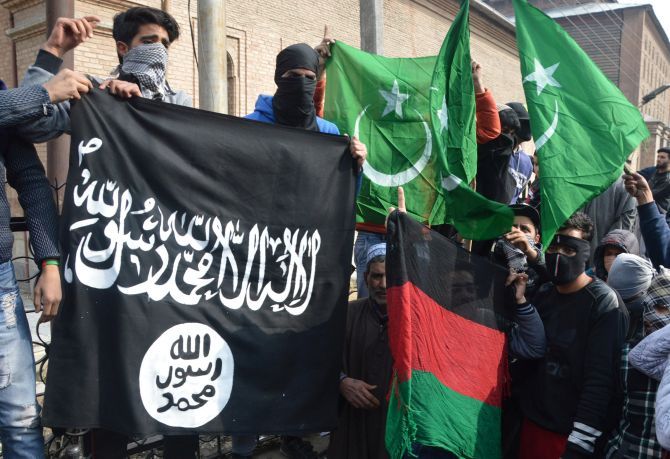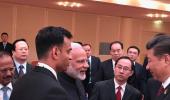'When the first Islamic State flags appeared, it was called an aberration.'
'When videos appeared, they were termed exceptions!'
'It is high time we accepted that the global jihad is here.'
Ajai Shukla reports from Kashmir.

Last Saturday, July 8, the spotlight on the civil uprising roiling southern Kashmir shifted temporarily to the improbably beautiful Loragam village, nestling in the foothills of the snow-clad Pir Panjal mountain range.
This was the home of Burhan Wani, the young Hizbul Mujahideen commander whose videotaped exhortations to fight India made him a star amongst the social media savvy Kashmiri youth, and a prime target for Indian security forces.
Wani met his end a year ago, on July 8, 2016, cornered by the Jammu and Kashmir police in a cordon in nearby Kokernag.
His funeral the next day was attended by tens of thousands of inflamed locals, even by the most conservative police estimates.
It triggered an outpouring of public violence in which police outposts were razed to the ground, 90 to 100 civilians shot dead by security forces and thousands injured, many of them blinded by shotgun pellets.
It has also set the pattern for civilian confrontation of armed policemen and soldiers.
Today unarmed villagers routinely gather at gunfights between the security forces and militants, pelting rocks at soldiers to allow the militants to escape.
Driving to Loragam through the sylvan Pulwama district last week, it was evident the security apparatus would not allow Wani's death anniversary to become occasion for a public rally that inflames the situation further.
At regular intervals we were stopped at check-posts manned by the police, or the army's Rashtriya Rifles, and allowed to proceed only after proving we are journalists.
The roads were near empty anyway, after three local militants were killed on July 4 in an encounter near Pulwama. One of them, Jehangir, was reportedly buried by thousands of mourners at his village, Keller.
This is now routine for every militant killed, with his life celebrated in YouTube videos that are watched feverishly on Facebook and WhatsApp.
"Slain militants become living legends on social media. And the celebration of their sacrifice attracts more youngsters to take up the gun," explained a local youngster who is guiding us to Loragam.
Reaching the village, we made our way to the local secondary school, where the principal is Burhan's father, Muzaffar Ahmed Wani, a courteous, grey-haired man who has just returned from the police station.
"They asked me what I was planning for Burhan's death anniversary. I said, 'Nothing, I plan to stay at home. But what can I do if people come to condole? I can't tell them to go away.'
Going around Pulwama district, it became clear that, notwithstanding the 'azaadi'(freedom) slogan that echoes through rallies, local allegiance is overwhelmingly towards Pakistan, rather than to Kashmir independence, as is widely believed in New Delhi.
"Azaadi' is a concept confined to the seminar circuit in India," scoffed a local youngster who sought anonymity.
"Take a look at any political rally and you will see only Pakistani flags. When a militant is killed, his coffin is wrapped in the Pakistani flag. Kashmiris have a deep sense of gratitude towards Pakistan."
Today, Pakistan's hold over Kashmiri youth faces a new challenge.
A short drive from Loragam is Noorpura, the village of Zakir Rashid Bhat, popularly known as Zakir Musa.
Breaking from the secessionist movement's traditional leadership -- the Hurriyat Conference -- Musa has advocated Kashmiri allegiance to Islamic State.
Diverging from the pro-Pakistan Hizbul Mujahideen and Lashkar-e-Tayiba, Zakir Musa's video messages advocate allegiance to a Khilafat (Caliphate), where the Nizam-e-Mustafa (the Prophet Mohammed's law, or Islamic law) prevails.
Last week, apparently piggy-backing on Burhan Wani's death anniversary, a new Musa video claimed that Wani too had advocated the same message.
However, while Wani had indeed issued pro-Khilafat and Nizam-e-Mustafa calls, he had remained, till the last, a Hizbul Mujahideen commander.
The threat of a new Islamic State has galvanised other constituencies.
New Delhi cites this as evidence that Kashmiri separatism is not a 'nationalist' movement, but rather linked with global terrorism movements like Daesh.
"How long will we remain in denial? When the first Islamic State flags appeared, it was called an aberration. When videos appeared, they were termed exceptions! It is high time we accepted that the global jihad is here," says a senior J&K policeman.
After an encounter in Pulwama on June 22, security forces released an audio recording in which a trapped terrorist, Majid Mir, was prompted by Zakir Musa to express his last wish as only Islamic State flags at his funeral, not Pakistani flags.
Musa is also a threat to the established secessionist leadership like the Hurriyat Conference and the Pakistan occupied Kashmir-based United Jihad Council, led by Hizbul Mujahideen chief Syed Salahuddin, for whom a trans-national Islamic State is anathema.
"The Hurriyat has never made Kashmir a Hindu-Muslim issue; and we have taken an official stance against turning Kashmir into a Khilafat. But Kashmiris cannot ignore the shrill anti-Muslim sentiment from New Delhi, including from the electronic media -- beef ban lynching, love jihad, anti-Muslim statements by the ruling party," said Mirwaiz Umer Farooq, a top Hurriyat leader who is the valley's most respected cleric.
"All this garners support for Zakir Musa and others like him," the Mirwaiz added.
Presiding over this disarray is Chief Minister Mehbooba Mufti, whose Peoples Democratic Party lost popular goodwill by entering into a political alliance with the Bharatiya Janata Party after the 2014 elections.
"In 2002, the PDP had effectively snatched political ground from the separatists through its quasi-separatist agenda. After allying with the RSS-powered BJP, it has lost that constituency to the 'resistance' leadership again," says Shabir Hussain, Editor. Kashmir Newsline.
"That is why South Kashmir, which was the PDP's bastion, has become the epicentre of the popular agitation."
IMAGE: Masked Kashmiri youth brandish Islamic State and Pakistan flags during a protest in Srinagar. Photograph: Umar Ganie











